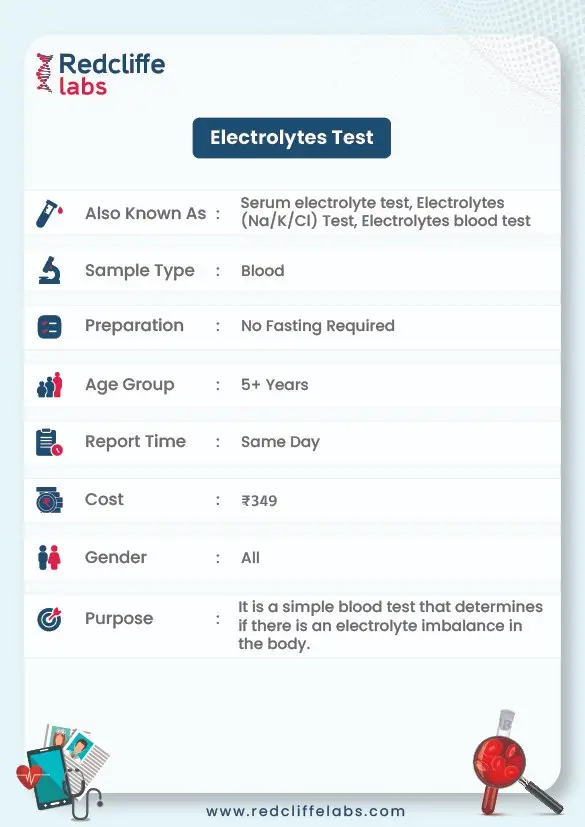This test measures sodium (Na), potassium (K), and c...Read more
Blood
Unlock special
discount on
this package
Login to Unlock 🔓
Also Known As
Electrolyte Blood Test, Serum Electrolyte Test, Electrolyte Panel Test, Blood Electrolyte Level TestNABL Accredited lab*

Booking Benefits Unlocked Worth FREE 799

Report Consultation

Diet Plan
*Available once your report is generated.
At Redcliffe Labs, we have a single goal: to give India its right to quality diagnostics.
Customers served
Tests Processed Everyday
Cities
Collection Centres
World Class In-house Labs
Home Collection Experts
Top Booked Health Checkup Packages
Reports in 12 hours
|Parameters 94
Reports in 12 hours
|Parameters 89
Reports in 12 hours
|Parameters 96
Reports in 12 hours
|Parameters 96
Reports in 12 hours
|Parameters 90
Helps you know your test better
Q. What is an Electrolyte imbalance?
Q. What is an Electrolytes test used for?
Q. What does Electrolytes Serum Test measures?
Q. Are there any risks associated with the test?
Verified by Medical Expert

WRITTEN BY
Sheena Mehta

MEDICALLY REVIEWED BY
Dr. Pradeep Lodha
Table of Content
Introduction to Electrolyte Test
An electrolytes test, also known as an electrolyte electrolytes blood test, measures the level of various electrolytes in the blood. Electrolytes are the minerals like sodium, potassium, and chloride with electric charges controlling several vital functions. These electrolytes play crucial roles in maintaining the balance of fluids, transmitting nerve signals, contracting muscles (including the heart), and supporting various metabolic functions. It helps transport nutrients into the cells and remove the waste matter from the body. The test measures the abnormal levels of electrolytes in the blood to diagnose multiple health diseases.
Electrolyte imbalances may cause various health issues, including kidney dysfunction, dehydration, and heart & hormonal imbalances. Symptoms of electrolyte imbalances can range from mild to severe and might include muscle weakness, irregular heartbeat, fatigue, confusion, and more. Your doctor might recommend the serum electrolytes test to determine the electrolyte level in the body that may cause these symptoms.
If you want to check your electrolyte level, you must choose Redcliffe Labs. We provide the best diagnostic services at affordable prices. When you book an appointment with us, a professional phlebotomist will come to your place for sample collection.
Test Details in Brief
| Also Known As | Serum electrolyte test, Electrolytes (Na/K/Cl) Test, Electrolytes blood test, Electrolyte lab test, sodium (Na), potassium (K), chloride (Cl), Carbon dioxide (CO2) |
| Purpose | It is a simple blood test that determines if there is an electrolyte imbalance in the body. |
| Preparation | Do not take any over-the-counter medicine without confirming with your doctor. |
| Fasting | No Fasting Required |
| Get Reports Within | Within 12 hours |
| Cost | INR 349 |

Purpose of the electrolytes test
A serum electrolyte test aims to assess the balance and concentration of these electrolytes in the blood. The test measures the amount of sodium, potassium, chloride, and bicarbonate.
- Diagnosis: Abnormal levels of electrolytes indicate various medical conditions. The test helps healthcare providers identify these conditions and determine the cause of the electrolyte imbalance.
- Monitoring: Regular monitoring can ensure that the imbalance is improving and adjustments to treatment if needed.
- Determining Treatment: The test helps healthcare providers to make treatment plans based on specific electrolyte imbalances.
What is the importance of an electrolyte test?
Electrolyte have an electric charge when dissolved in water. They are minerals present in your blood, tissues, urine, and other body fluids. Electrolytes are crucial because:
- Help balance the amount of water in your body.
- They are important to balance out the pH level of your body.
- Electrolyte move nutrients into your cells.
- Help control your heart rate and rhythm.
- Stabilizes your blood pressure.
- Strengthen your bones and teeth.
What is an electrolytes test used for?
An electrolytes test or an electrolyte panel test is often included in a routine blood test or a comprehensive metabolic panel (CMP).
Your healthcare provider may also suggest the test to find out fluid imbalances or an imbalance in pH levels.
All the electrolytes such as sodium, chloride, potassium, bicarbonate, calcium, magnesium, and phosphate are usually measured together. However, they may be tested individually, especially when your healthcare professional thinks your body has a specific electrolyte imbalance. It is due to symptoms such as cramps, dizziness, vomiting, weakness, confusion, or swelling.
Why do you need the electrolyte panel test?
You may need the electrolyte panel test because it is suggested by doctors for people with heart disease or high blood pressure. It is a part of a comprehensive blood panel that helps assess heart failure, kidney disease, and hypertension.
Additionally, you may need this test if your body shows signs of electrolytes imbalance:
- Numbness in your hands, arms, legs, fingers, and legs
- Headache
- Weakness
- Tiredness
- Nausea and vomiting
- Fast or irregular heartbeat
- Confusion
- Irritability
- Cramps or spasms
What does the electrolytes blood test measure?
The electrolytes test measures the levels of specific electrolytes in the blood. Electrolytes are ions (charged particles) that play essential roles in various physiological processes within the body. The major electrolytes measured in an electrolyte test include:
- Sodium (Na+): Sodium is essential for maintaining fluid balance, nerve function, and muscle contraction. Abnormal sodium levels can indicate dehydration, kidney problems, heart conditions, and more.
- Potassium (K+): Potassium is vital for proper nerve and muscle function, including heart rhythm regulation. Imbalances can lead to muscle weakness, heart arrhythmias, and more.
- Chloride (Cl-): Chloride works with sodium to maintain fluid balance and help with nerve function. Imbalances can be linked to kidney issues and conditions affecting acid-base balance.
- Bicarbonate (HCO3-): Bicarbonate is essential in the body's acid-base buffering system, helping maintain proper pH levels. Abnormal levels can indicate respiratory or metabolic disorders.
- Calcium (Ca2+): Calcium is vital for bone health, muscle contraction, blood clotting, and nerve transmission. Imbalances can result from thyroid problems, kidney issues, and certain medications.
- Magnesium (Mg2+): Magnesium plays a role in muscle and nerve function, energy production, and bone health. Imbalances can be associated with kidney disease, alcoholism, and certain medications.
Preparation of the test
There is no such preparation required for an S electrolyte test. Just follow a few general guidelines to ensure accurate and reliable results.
- No fasting required: Usually, no fasting is required for the test. You can eat and drink normally.
- Medications: Inform your healthcare provider about any medicines, supplements, or over-the-counter drugs you are taking. Some medications can affect electrolyte levels, so consult your doctor before the test.
- Avoid Nicotine: It's generally recommended to avoid alcohol and tobacco in the hours leading up to the test, as they can impact the electrolyte balance.
- Stay hydrated: Drink plenty of water before the test to help blood flow more easily through blood vessels.
The procedure of the Electrolyte blood test
A phlebotomist will draw the blood from your vein. They will clean the area, apply a tourniquet to make the veins more prominent, and then insert a needle to draw the blood. The blood sample is collected in a special tube that prevents clotting and allows accurate testing. The tube will be labeled with your information and sent to the laboratory.

Procedure for a urine collection for an Electrolytes test
If a healthcare provider suggests a test to check your electrolytes in urine, you can book an appointment with a phlebotomist. The phlebotomist will come to your place to collect the urine sample at a given time.
Precautions while collecting a urine sample:
- Before the test, make sure you drink a lot of water.
- Wash your intimate area before peeing.
- Do not include feces in the urine collection.
- Use a clean urine collection device for accurate lab evaluation.
So, why wait? Get yourself tested from Healthy India Ki Trusted Lab-Redcliffe Labs without delay! .
What do the electrolyte blood test results indicate?
The serum or plasma will be analyzed using specialized laboratory equipment to measure the concentration of various electrolytes, such as sodium, potassium, chloride, bicarbonate, calcium, and magnesium.
The results are usually measured in millimoles per liter (mmol/L). Healthcare professionals will interpret these results based on your medical history, symptoms, and other factors.
Sodium (Na+):
- Low Sodium (Hyponatremia): This can be caused by excessive fluid intake, certain medications, kidney problems, or conditions like heart failure.
- High Sodium (Hypernatremia): Often due to dehydration, excessive sweating, kidney dysfunction, or certain medications.
Potassium (K+):
- Low Potassium (Hypokalemia): Can result from diuretic use, kidney problems, vomiting, or certain medications. It can lead to muscle weakness, heart arrhythmias, and more.
- High Potassium (Hyperchloremia): This might be caused by kidney dysfunction, certain medications, or medical conditions. It can lead to dangerous heart rhythm disturbances.
Chloride (Cl-):
- Low Chloride (Hypochloremia): The condition is usually linked to affecting acid-base balance, vomiting, or certain medications.
- High Chloride: Often occurs alongside high sodium levels and can be due to dehydration, kidney issues, or metabolic disorders.
Bicarbonate (HCO3-):
- Low Bicarbonate: This might indicate metabolic acidosis due to kidney disease, diabetes, or lung disorders.
- High Bicarbonate: Could be associated with metabolic alkalosis due to certain kidney disorders or excessive vomiting.
Calcium (Ca2+):
- Low Calcium (Hypocalcemia): This might result from parathyroid disorders, kidney problems, or vitamin D deficiency. It can affect bone health, muscle function, and nerve transmission.
- High Calcium (Hypercalcemia): Can be caused by conditions like hyperparathyroidism, certain cancers, or prolonged immobility.
Magnesium (Mg2+):
- Low Magnesium (Hypomagnesemia): This can result from alcoholism, certain medications, kidney problems, or malnutrition. It can lead to muscle cramps, tremors, and cardiac arrhythmias.
- High Magnesium (Hypermagnesemia): Often associated with kidney dysfunction or excessive magnesium supplementation.
Phosphate:
- Low Phosphate (Hypophosphatemia): It is a short-term condition that occurs when phosphate levels are low in your blood. Mild hypophosphatemia is less bothersome, but severe hypophosphatemia can pose a threat to your life. Low phosphate levels occur due to muscle weakness, respiratory failure, and heart failure. Consult your healthcare provider for immediate treatment.
- High Phosphate (Hyperphosphatemia):It indicates too much phosphate in the blood. Its main causes are hypoparathyroidism, advanced chronic kidney disease, and metabolic and respiratory acidosis. Besides, this condition usually occurs.
What is the normal range of electrolytes?
The normal electrolyte ranges depend upon age, sex, and preexisting health conditions. In general, the normal range of electrolytes in adults is:
| Electrolytes | Normal Range |
| Sodium | 136 to 144 mmol/L |
| Potassium | 3.7 to 5.1 mmol/L |
| Calcium | 8.5 to 10.2 mg/dL |
| Chloride | 97 to 105 mmol/L |
| Magnesium | 1.7 to 2.2 mg/dL |
| Phosphate | 2.5 to 4.8 mg/dL |
| Bicarbonate | 22 to 30 mmol/L |
What is the role of Electrolytes?
Electrolytes are blood, tissue, urine, and other body fluids and minerals. Electrolytes play crucial roles in various physiological processes within the body. These charged particles are essential for maintaining the proper functioning of cells, tissues, and organs. Here are some of the key roles that electrolytes fulfill:
- Regulate the balance of fluids within and between cells.
- Controlling your heart rate and rhythm
- Promotes strong bones and teeth. and muscle function
- Stabilizing blood pressure
- Regulate the body's acid-base balance (pH).
- Calcium ions are essential for blood clotting (coagulation).
- Transport nutrients, waste products, and other ions across cell membranes.
Why do doctors recommend electrolyte testing?
Doctors might recommend the electrolyte test for various reasons, mainly to assess the balance and concentration of electrolytes in their blood. Electrolytes blood test helps find out the cause of various health conditions and multiple functions.
- An electrolyte imbalance may cause liver and kidney function issues. It is also helpful to check the nutritional status and hydration.
- If you are experiencing symptoms like muscle weakness, cramps, fatigue, irregular heartbeat, confusion, or changes in blood pressure, an S electrolyte test can help identify whether electrolyte imbalances contribute to these symptoms.
- Electrolyte levels can be affected by changes in fluid balance, so the test can help assess whether an individual is dehydrated or overhydrated.
- Electrolyte imbalances can lead to heart arrhythmias and other cardiac issues. An electrolyte test helps monitor electrolyte levels in individuals with heart conditions.
Risk factors of Imbalanced Electrolytes
Electrolyte test can detect the electrolyte imbalances caused by:
- Burns
- Cancer
- Dehydration
- Diabetes
- Cardiovascular disease, heart failure, or high blood pressure
- Kidney disease
- Liver diseases like cirrhosis
- Overhydration or water intoxication
- Substance use disorder
Electrolyte Imbalance Symptoms
Electrolyte imbalances can lead to a range of symptoms. Here are some common symptoms:
- Confusion and irritability
- Fatigue
- Headaches
- Diarrhea or constipation
- Irregular or fast heart rate
- Muscle weakness and cramps
- Nausea and vomiting
- Numbness or tingling in limbs, fingers, and toes
- Constipation

Is there anything else I need to know about an electrolyte panel?
Yes. Sometimes, healthcare professionals suggest an anion gap blood test, along with an electrolytes test. He may also order a blood gas test to rule out the cause of the problem.
Anion gap blood test: It is to differentiate between the negatively charged electrolytes and positively charged electrolytes. If the anion gap is too high or too low, it is a cause of concern. Too high anion gap indicates your blood is more acidic than normal. If the anion gap is too low, your blood is not acidic enough.
Blood gas test: Your specialist may suggest the test to measure oxygen, carbon dioxide, and acidity in your blood. Through this test, it becomes easy for them to find the cause of an acid-base (pH) imbalance, like a kidney or liver problem.
Additionally, a blood test for blood glucose (sugar), or a basic urinalysis, or an electrocardiogram (ECG) along with an electrolyte test may be suggested.
Other Electrolytes Related Tests/Packages That You Can Book with Redcliffe Labs
| Tests/Packages | Price in INR |
| Electrolytes (Na/K/Cl), Urine Test | ₹349 |
| Metabolic Panel Essential | ₹699 |
| Nerve Health Check | ₹1299 |
| Vitamins & Mineral Screening Package | ₹1299 |
| Immunity care package | ₹2199 |
Electrolytes Test Near Me @349
The electrolytes test price is INR 349 at Redcliffe Labs.
When your doctor suggests an Electrolyte panel test, there's no better choice than us. Our rates are unbeatable, giving you peace of mind and confidence in your decision. Trust us as your diagnostic partner to experience the best services from home. Schedule your appointment online now by searching "electrolyte test at home."

Electrolytes Test Cost in Different Cities - Redcliffe Labs
| City Name | Discounted Price |
| Delhi | ₹349 |
| Ahmedabad | ₹349 |
| Mumbai | ₹349 |
| Bangalore | ₹349 |
| Noida | ₹349 |
| Pune | ₹349 |
| Lucknow | ₹349 |
| Hyderabad | ₹349 |
| Chennai | ₹349 |
| Gurgaon | ₹349 |
| Jaipur | ₹349 |
| Faridabad | ₹349 |
| Indore | ₹349 |
| Patna | ₹349 |
Note: We also offer Electrolytes Test PAN India. Please call the number 8988988787 to check the availability of our services in your area.
Book your Serum electrolytes test Today!
Whether too high or too low, electrolyte imbalance can lead to various health issues. Hence, the proper diagnosis and treatment is essential to restore the electrolyte balance. Consult your doctor and get an electrolyte blood test to check the level of electrolytes in your body.
You can choose Redcliffe Labs to experience the best diagnostic services. Our professional phlebotomist will come to your place for a sample collection within 45 minutes. We promise to provide reliable and accurate S-electrote test reports within 12 hours. So, why are you still waiting? Call us or book an appointment online.
Get in touch with Redcliffe Labs for a reliable electrolyte panel blood test!
If suggested, call directly or download the Redcliffe Labs mobile app to book an electrolyte panel blood test or electrolyte urine test. The phlebotomist will come to your doorstep with a blood and urine sample collection kit, ensuring painless and safe services. Get the most accurate reports, typically within 12 hours.
Step-by-step information on booking a blood test for an electrolyte panel test online from Redcliffe Labs.
- Visit the official Redcliffe Labs website: https://redcliffelabs.com/.
- Search for the specific test you need.
- Add the test to the cart.
- Complete the payment process online.
- You will receive confirmation through SMS and WhatsApp.
5 Simple Steps to Manage Your Health with Redcliffe Labs
Quick, Simple & Convenient; trusted care delivered to your doorstep.

Start Your Online Booking
Open the Redcliffe Labs website/app. Select the test or package and enter your details. Schedule the service for your preferred slot.

Live Tracking
Stay updated with real-time tracking for a smooth and timely home sample collection.

Sample Collection
Our certified experts ensure a smooth, hygienic, and fully compliant sample collection experience.

Doctor-Verified Smart Reports
Every report is clinically checked by expert doctors and shared with smart, actionable insights.

Your Health Journey Continues Post Reports
Consult with our expert medical team to get actionable insights to improve your health.
Nearby Labs(9)
Redcliffe Labs Noida

MC-5280
Redcliffe Collection Center
Redcliffe Collection Center
Redcliffe Collection Center
Redcliffe Collection Center
Redcliffe Collection Center
Redcliffe Collection Center
Redcliffe Collection Center
Redcliffe Collection Center
Frequently Asked Questions
What is an electrolyte test?
Does the electrolyte blood test require fasting?
How is the electrolyte test done?
What is the electrolytes test done for?
What are electrolytes in blood tests?
Can electrolyte tests help to find thyroid problems?
How long does it take to process an electrolyte test?
How often do you test electrolytes?
What are the symptoms of an electrolyte imbalance?
Can electrolyte imbalances be treated?
Who should get an electrolyte test?
Can medications affect electrolyte levels?
Are electrolyte tests painful?
What foods can help maintain healthy electrolyte levels?
How do exercise and sweating affect electrolyte levels?
What happens if electrolyte imbalance is left untreated?
How much does an electrolyte test cost?
What is the normal range for electrolyte levels?
- Sodium: 135-145 mEq/L
- Potassium: 3.5-5.0 mEq/L
- Chloride: 96-106 mEq/L
- Bicarbonate: 22-28 mEq/L
Can I book a Electrolytes (Na/K/Cl) Test near me?
Can I book a home collection for a Electrolytes (Na/K/Cl) Test?
Health Articles & Blogs
My Health
Stay informed with our expert health articles and blogs. Explore comprehensive guides on diseases, nutrition, preventive care, and wellness tips to help you make better health decisions.
Why is PCOS Continuously Rising in Women?

10 Healthy Holi Recipes for Your Fitness Goals in 2026
Looking for healthy Holi recipes? Discover 10 festive dishes that support your fitness goals while keeping celebrations delicious.

Importance of Heart Health Before Pregnancy: Everything You Need to Know

Migraine Treatment at Home: Effective Ways to Relieve Migraines Naturally

High SGPT and SGOT Levels: Causes, Symptoms, Normal Range & When to Worry

Brain Hemorrhage Symptoms: Early Warning Signs, Types, Causes & When to Seek Emergency Care

What is SGPT in Blood Reports? Everything You Need to Know

Capsicum (Shimla Mirch) 101: Benefits, Nutritional Value, Uses and More
Explore My Health
